#learning python programming book
Explore tagged Tumblr posts
Text
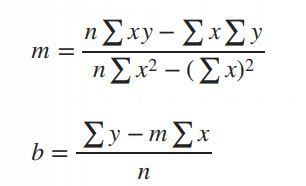
Simple Linear Regression in Data Science and machine learning
Simple linear regression is one of the most important techniques in data science and machine learning. It is the foundation of many statistical and machine learning models. Even though it is simple, its concepts are widely applicable in predicting outcomes and understanding relationships between variables.
This article will help you learn about:
1. What is simple linear regression and why it matters.
2. The step-by-step intuition behind it.
3. The math of finding slope() and intercept().
4. Simple linear regression coding using Python.
5. A practical real-world implementation.
If you are new to data science or machine learning, don’t worry! We will keep things simple so that you can follow along without any problems.
What is simple linear regression?
Simple linear regression is a method to model the relationship between two variables:
1. Independent variable (X): The input, also called the predictor or feature.
2. Dependent Variable (Y): The output or target value we want to predict.
The main purpose of simple linear regression is to find a straight line (called the regression line) that best fits the data. This line minimizes the error between the actual and predicted values.
The mathematical equation for the line is:
Y = mX + b
: The predicted values.
: The slope of the line (how steep it is).
: The intercept (the value of when).
Why use simple linear regression?
click here to read more https://datacienceatoz.blogspot.com/2025/01/simple-linear-regression-in-data.html
#artificial intelligence#bigdata#books#machine learning#machinelearning#programming#python#science#skills#big data#linear algebra#linear b#slope#interception
6 notes
·
View notes
Text
Top Programming Books For Beginners ...
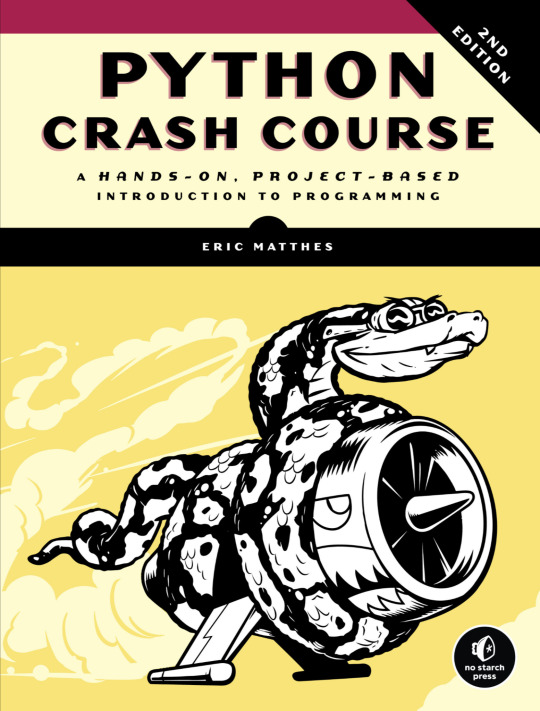
Post #38: Analytics Insight, Top 10 Python Programming Books For Beginners, 2023.
#coding#coding is fun#programming#i love coding#education#i love programming#learning#coding for kids#i love python#programming language#python for ever#python#python coding#educacion#teaching#i love tumblr#i love books
4 notes
·
View notes
Text



Post #56: Amazon, Kindle Challenge at the end of the year from October 1, 2024 until December 31, 2024.
#amazon kindle#kindle#kindle challenge#reading#ebooks#kindle ebooks#challenge#computer books#programming#computing#teaching#education#educate yourself#learning#lenovo computer#samsung computer#xiaomi computer#programmieren#coding#studying#python#small basic#small visual basic#scratch#turtle programming#coding for kids
1 note
·
View note
Text
Dr. Ranjan Kumar Mishra Co-authors New Book on Machine Learning and IoT
Dr. Ranjan Kumar Mishra publishes his second book, “Machine Learning and IoT,” under REST Publication. Dr. Ranjan Kumar Mishra, Dean of IT at Netaji Subhash University, Jamshedpur, has co-authored his second book, “Machine Learning and IoT,” aimed at providing comprehensive knowledge in these fields. JAMSHEDPUR – Dr. Ranjan Kumar Mishra, an esteemed academic and Dean of IT at Netaji Subhash…
#academic resources#शिक्षा#Dr. Ranjan Kumar Mishra#education#Engineering Students#IoT#Jamshedpur#machine learning#Netaji Subhash University#new book release#Python Programming#REST Publication#technology education
0 notes
Text
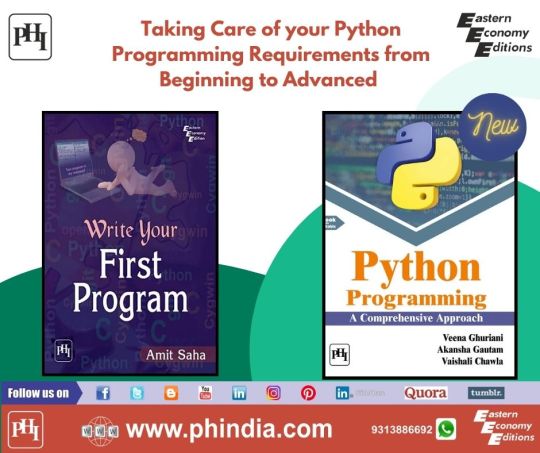
Created by Guido van Rossum, and released in 1991, Python is currently the most widely used multi-purpose, high-level programming language, which allows programming in Object-Oriented and Procedural paradigms. AI and data sciences has take centre-stage world-wide, India too is catching up with it. We have learning resources from school students (beginners) to advanced learners,
Our two books by Amit Saha and Veena Ghuriani et al are perfect texts for them. Know about the 2 books more http://social.phindia.com/GZEc_UWY. You can also buy them at 30% discount using the code PHI60Anniversary.
Both the books are available on Amazon and Flipkart also.
#python#pythonprogramming#pythonprojects#programminglanguage#coding#programming#philearning#phibooks#phibookclub#undergraduate#books#learn to code#programmer#code
1 note
·
View note
Text
It is crucial to learn Python from the best resources available. books are one of the best resources to learn anything so we are going to check out the 5 best Python books for beginners. the episode of this podcast is dedicated to the top 5 Python books to build a strong foundation for beginners.
#best python book for beginners#python programming book#best book for python programming#python programming book for beginners#book for python programming#best book for python programming pdf#latest Python books#free Python books#Python Crash Course#Head First Python#Learn Python the Hard Way#Python Programming An Introduction to Computer Science#Automate the Boring Stuff with Python#best python book for beginners in India#SoundCloud
0 notes
Text
Ad | Hi folks, I'd previously been getting into the swing of posting Humble Bundle deals and the charities they were helping. With any non-bundle purchases helping to raise money for Endometriosis research and support. Then Humble decided to outsource their partner program to a system called 'Impact' which has honestly been a massive pain to get my head round. Looks like I can't link to bundles directly and they only give me the above link to share.
There is currently:
The TellTale Games Bundle featuring Batman, the Expanse, the Walking Dead, the Wolf Among Us - Currently raising money for Save the Children
The Sid Meier Collection with every Civilization game and DLC I can think of - Raising money for Covenant House and Michael J. Fox Foundation for Parkinson's Research
Math for Programmers Book Bundle which contains a whole bunch of data science, cryptography and Python books - Raising money for Girls Who Code
Learn Unit Game Development Course - From Shaders to 3D to a course on Game Feel - Raising money for Oceana
Super Game Asset Bundle for Unreal, Godot, and Unity. Over 7000 audio, visual and environmental assets - Raising money for Direct Relief.
Not sure if this format is okay, it requires you to visit the link and navigate but hope it helps? Let me know.
176 notes
·
View notes
Text
back to basics


mostly free resources to help you learn the basics that i've gathered for myself so far that i think are cool
everyday
gcfglobal - about the internet, online safety and for kids, life skills like applying for jobs, career planning, resume writing, online learning, today's skills like 3d printing, photoshop, smartphone basics, microsoft office apps, and mac friendly. they have core skills like reading, math, science, language learning - some topics are sparse so hopefully they keep adding things on. great site to start off on learning.
handsonbanking - learn about finances. after highschool, credit, banking, investing, money management, debt, goal setting, loans, cars, small businesses, military, insurance, retirement, etc.
bbc - learning for all ages. primary to adult. arts, history, science, math, reading, english, french, all the way to functional and vocational skills for adults as well, great site!
education.ket - workplace essential skills
general education
mathsgenie - GCSE revision, grade 1-9, math stages 1-14, provides more resources! completely free.
khan academy - pre-k to college, life skills, test prep (sats, mcat, etc), get ready courses, AP, partner courses like NASA, etc. so much more!
aleks - k-12 + higher ed learning program. adapts to each student.
biology4kids - learn biology
cosmos4kids - learn astronomy basics
chem4kids - learn chemistry
physics4kids - learn physics
numbernut - math basics (arithmetic, fractions and decimals, roots and exponents, prealgebra)
education.ket - primary to adult. includes highschool equivalent test prep, the core skills. they have a free resource library and they sell workbooks. they have one on work-life essentials (high demand career sectors + soft skills)
youtube channels
the organic chemistry tutor
khanacademy
crashcourse
tabletclassmath
2minmaths
kevinmathscience
professor leonard
greenemath
mathantics
3blue1brown
literacy
readworks - reading comprehension, build background knowledge, grow your vocabulary, strengthen strategic reading
chompchomp - grammar knowledge
tutors
not the "free resource" part of this post but sometimes we forget we can be tutored especially as an adult. just because we don't have formal education does not mean we can't get 1:1 teaching! please do you research and don't be afraid to try out different tutors. and remember you're not dumb just because someone's teaching style doesn't match up with your learning style.
cambridge coaching - medical school, mba and business, law school, graduate, college academics, high school and college process, middle school and high school admissions
preply - language tutoring. affordable!
revolutionprep - math, science, english, history, computer science (ap, html/css, java, python c++), foreign languages (german, korean, french, italian, spanish, japanese, chinese, esl)
varsity tutors - k-5 subjects, ap, test prep, languages, math, science & engineering, coding, homeschool, college essays, essay editing, etc
chegg - biology, business, engineering/computer science, math, homework help, textbook support, rent and buying books
learn to be - k-12 subjects
for languages
lingq - app. created by steve kaufmann, a polygot (fluent in 20+ languages) an amazing language learning platform that compiles content in 20+ languages like podcasts, graded readers, story times, vlogs, radio, books, the feature to put in your own books! immersion, comprehensible input.
flexiclasses - option to study abroad, resources to learn, mandarin, cantonese, japanese, vietnamese, korean, italian, russian, taiwanese hokkien, shanghainese.
fluentin3months - bootcamp, consultation available, languages: spanish, french, korean, german, chinese, japanese, russian, italian.
fluenz - spanish immersion both online and in person - intensive.
pimsleur - not tutoring** online learning using apps and their method. up to 50 languages, free trial available.
incase time has passed since i last posted this, check on the original post (not the reblogs) to see if i updated link or added new resources. i think i want to add laguage resources at some point too but until then, happy learning!!
#study#education resources#resources#learning#language learning#math#english languages#languages#japanese#mandarin#arabic#italian#computer science#wed design#coding#codeblr#fluency#online learning#learn#digital learning#education#studyinspo#study resources#educate yourselves#self improvement#mathematics#mathblr#resource
761 notes
·
View notes
Note
hi!! do you have any free resources or textbooks for learning python? i’m doing my dissertation and i need a refresher before i start doing it properly. thanks!!
Hiya! 💗
Here you go:
Book
Python Objects and Classes
Roadmap.sh
Random Python Resources
Top 20 Python Projects for Beginners to Master the Language
Free Programming Books
Python Notes and Resources by @trialn1error
Python Official Roadmap
Python Project List
Python 3 Cheat Sheet
Python Cheatsheet for Beginners
These are the ones' I've shared on my blog over the years! Hope their helpful! 🥰👍🏾💗
#my asks#resources#python resources#codeblr#coding#progblr#programming#studying#studyblr#learn to code#comp sci#tech#programmer
342 notes
·
View notes
Text
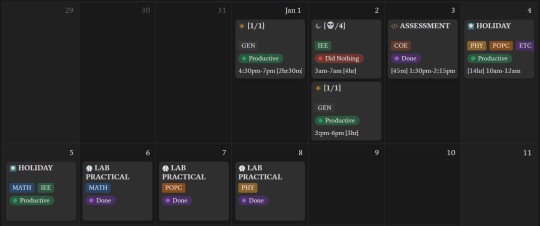


LAB PREP + PRACTICALS WEEK [1st Jan - 9th Jan]
a quick summary!
happy belated new YEARRRR (we're six weeks into the new year time is so slippery and for what T_T)
I finished like 10 pens writing assignments and record books this week and didn't study at all so I failed an html mock assessment thing lol but its cool
the events of each lab: math: it was python, but they taught us jack-shit so I ended up memorizing the programs 2 hours before the lab, and passed with flying colours 👍 there was no viva thank god c lang: they gave us 10 programs to study and I'd actually pre-prepared for this because our professor tricked us into thinking it was a week before. I spent like 20 hours straight learning these programs a week ago and it didn't even happen T_T it went fking amazing though, and so did viva!! I got full marks!! :D physics: studied the experiment write-ups the night before and kind of forgot some of it because the experiment I ended up getting had some heavy content - there were so many tables and so many graphs T_T - I persevered though and breezed through the actual experiment conduction because I'd been teaching it to my lab-mates the past week! I thought my viva went disastrously BUT I passed with a 0.4 deduction only!!
my uni's tea is the best tea 👍
18 notes
·
View notes
Text
Why Not Write Cryptography
I learned Python in high school in 2003. This was unusual at the time. We were part of a pilot project, testing new teaching materials. The official syllabus still expected us to use PASCAL. In order to satisfy the requirements, we had to learn PASCAL too, after Python. I don't know if PASCAL is still standard.
Some of the early Python programming lessons focused on cryptography. We didn't really learn anything about cryptography itself then, it was all just toy problems to demonstrate basic programming concepts like loops and recursion. Beginners can easily implement some old, outdated ciphers like Caesar, Vigenère, arbitrary 26-letter substitutions, transpositions, and so on.
The Vigenère cipher will be important. It goes like this: First, in order to work with letters, we assign numbers from 0 to 25 to the 26 letters of the alphabet, so A is 0, B is 1, C is 2 and so on. In the programs we wrote, we had to strip out all punctuation and spaces, write everything in uppercase and use the standard transliteration rules for Ä, Ö, Ü, and ß. That's just the encoding part. Now comes the encryption part. For every letter in the plain text, we add the next letter from the key, modulo 26, round robin style. The key is repeated after we get tot he end. Encrypting "HELLOWORLD" with the key "ABC" yields ["H"+"A", "E"+"B", "L"+"C", "L"+"A", "O"+"B", "W"+"C", "O"+"A", "R"+"B", "L"+"C", "D"+"A"], or "HFNLPYOLND". If this short example didn't click for you, you can look it up on Wikipedia and blame me for explaining it badly.
Then our teacher left in the middle of the school year, and a different one took over. He was unfamiliar with encryption algorithms. He took us through some of the exercises about breaking the Caesar cipher with statistics. Then he proclaimed, based on some back-of-the-envelope calculations, that a Vigenère cipher with a long enough key, with the length unknown to the attacker, is "basically uncrackable". You can't brute-force a 20-letter key, and there are no significant statistical patterns.
I told him this wasn't true. If you re-use a Vigenère key, it's like re-using a one time pad key. At the time I just had read the first chapters of Bruce Schneier's "Applied Cryptography", and some pop history books about cold war spy stuff. I knew about the problem with re-using a one-time pad. A one time pad is the same as if your Vigenère key is as long as the message, so there is no way to make any inferences from one letter of the encrypted message to another letter of the plain text. This is mathematically proven to be completely uncrackable, as long as you use the key only one time, hence the name. Re-use of one-time pads actually happened during the cold war. Spy agencies communicated through number stations and one-time pads, but at some point, the Soviets either killed some of their cryptographers in a purge, or they messed up their book-keeping, and they re-used some of their keys. The Americans could decrypt the messages.
Here is how: If you have message $A$ and message $B$, and you re-use the key $K$, then an attacker can take the encrypted messages $A+K$ and $B+K$, and subtract them. That creates $(A+K) - (B+K) = A - B + K - K = A - B$. If you re-use a one-time pad, the attacker can just filter the key out and calculate the difference between two plaintexts.
My teacher didn't know that. He had done a quick back-of-the-envelope calculation about the time it would take to brute-force a 20 letter key, and the likelihood of accidentally arriving at something that would resemble the distribution of letters in the German language. In his mind, a 20 letter key or longer was impossible to crack. At the time, I wouldn't have known how to calculate that probability.
When I challenged his assertion that it would be "uncrackable", he created two messages that were written in German, and pasted them into the program we had been using in class, with a randomly generated key of undisclosed length. He gave me the encrypted output.
Instead of brute-forcing keys, I decided to apply what I knew about re-using one time pads. I wrote a program that takes some of the most common German words, and added them to sections of $(A-B)$. If a word was equal to a section of $B$, then this would generate a section of $A$. Then I used a large spellchecking dictionary to see if the section of $A$ generated by guessing a section of $B$ contained any valid German words. If yes, it would print the guessed word in $B$, the section of $A$, and the corresponding section of the key. There was only a little bit of key material that was common to multiple results, but that was enough to establish how long they key was. From there, I modified my program so that I could interactively try to guess words and it would decrypt the rest of the text based on my guess. The messages were two articles from the local newspaper.
When I showed the decrypted messages to my teacher the next week, got annoyed, and accused me of cheating. Had I installed a keylogger on his machine? Had I rigged his encryption program to leak key material? Had I exploited the old Python random number generator that isn't really random enough for cryptography (but good enough for games and simulations)?
Then I explained my approach. My teacher insisted that this solution didn't count, because it relied on guessing words. It would never have worked on random numeric data. I was just lucky that the messages were written in a language I speak. I could have cheated by using a search engine to find the newspaper articles on the web.
Now the lesson you should take away from this is not that I am smart and teachers are sore losers.
Lesson one: Everybody can build an encryption scheme or security system that he himself can't defeat. That doesn't mean others can't defeat it. You can also create an secret alphabet to protect your teenage diary from your kid sister. It's not practical to use that as an encryption scheme for banking. Something that works for your diary will in all likelihood be inappropriate for online banking, never mind state secrets. You never know if a teenage diary won't be stolen by a determined thief who thinks it holds the secret to a Bitcoin wallet passphrase, or if someone is re-using his banking password in your online game.
Lesson two: When you build a security system, you often accidentally design around an "intended attack". If you build a lock to be especially pick-proof, a burglar can still kick in the door, or break a window. Or maybe a new variation of the old "slide a piece of paper under the door and push the key through" trick works. Non-security experts are especially susceptible to this. Experts in one domain are often blind to attacks/exploits that make use of a different domain. It's like the physicist who saw a magic show and thought it must be powerful magnets at work, when it was actually invisible ropes.
Lesson three: Sometimes a real world problem is a great toy problem, but the easy and didactic toy solution is a really bad real world solution. Encryption was a fun way to teach programming, not a good way to teach encryption. There are many problems like that, like 3D rendering, Chess AI, and neural networks, where the real-world solution is not just more sophisticated than the toy solution, but a completely different architecture with completely different data structures. My own interactive codebreaking program did not work like modern approaches works either.
Lesson four: Don't roll your own cryptography. Don't even implement a known encryption algorithm. Use a cryptography library. Chances are you are not Bruce Schneier or Dan J Bernstein. It's harder than you thought. Unless you are doing a toy programming project to teach programming, it's not a good idea. If you don't take this advice to heart, a teenager with something to prove, somebody much less knowledgeable but with more time on his hands, might cause you trouble.
350 notes
·
View notes
Text
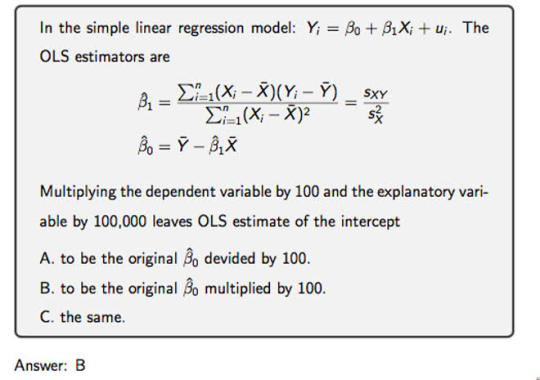
Beginner’s Guide to Ridge Regression in Machine Learning
Introduction
Regression analysis is a fundamental technique in machine learning, used to predict a dependent variable based on one or more independent variables. However, traditional regression methods, such as simple linear regression, can struggle to deal with multicollinearity (high correlation between predictors). This is where ridge regression comes in handy.
Ridge regression is an advanced form of linear regression that reduces overfitting by adding a penalty term to the model. In this article, we will cover what ridge regression is, why it is important, how it works, its assumptions, and how to implement it using Python.
What is Ridge Regression?
Ridge regression is a type of regularization technique that modifies the linear
click here to read more
https://datacienceatoz.blogspot.com/2025/02/a-beginners-guide-to-ridge-regression.html
#artificial intelligence#bigdata#books#machine learning#machinelearning#programming#python#science#skills#big data
4 notes
·
View notes
Text

Playlist for the day: "You're Studying at an Oxford Library at Night"
youtube
Spent the day at the community center/library today and was more productive than I thought I would be. Lots of Python and GMAT prep today. I took another attempt at my Python data analysis assignment; and I'm really not understanding it. I'm not sure where to go from here- typically I enjoy studying on my own time and taking online courses because the projects have a much more realistic application. For example the goal is usually to create a program however this course really reminds me of school in the sense that the assignment is multiple choice questions that don't apply to how I would work in an organization for example. I'm struggling with this as I've spent so much time on obtaining the certificate and I'm over halfway done but can't get it without this project
What I got done today: ☕ALL assignments for unit 1 and 2 for CS50 (and part-way through the unit 3 assignments) ☕Went to the library and picked up some books ☕Drafted work messages ☕Data analysis course unit 6.1 and 6.2 ☕Got up to ch. 5 of 'Industries of the Future' ☕Leveled up in Italian Duolingo and learned some phrases online
#studyblr#studyspo#daily journal#study motivation#light academia#dark academia#study blog#to do list#coding#langauge learning#codeblr#langblr#chaotic academia#becoming that girl#it girl energy#that girl#glow up#clean girl#Youtube
12 notes
·
View notes
Note
Hi! You mentioned there are online tutorials/sites for learning Comp Sci and OSINT - any recommendations? Thanks!
Hi! You got lucky that today is the day I check my inbox lol. So. For comp-sci: - CS50X from Harvard is a public avaiable course on youtube I'd 100% recommend. These are the undedited (so far) lectures of 2024: https://www.youtube.com/watch?v=3LPJfIKxwWc&list=PLhQjrBD2T381WAHyx1pq-sBfykqMBI7V4&ab_channel=CS50
This gives you all the basics you need to understand how coding and pcs in general works. (I had comp sci in my university course)
- Freecodecamp is a website full of FREE tutorials on several programming language. Advice: learn python. You will understand later on.
- The rest really depends on what you actually want to learn and why - each programming language has its own purpose and application. OSINT: -There is this full course: https://www.youtube.com/watch?v=qwA6MmbeGNo&t=205s&ab_channel=TheCyberMentor (But you can find more on youtube.) - Bellingcat's resources: https://www.bellingcat.com/category/resources/ -IntelTecniques: https://inteltechniques.com/ - Osint Newesletter: https://osintnewsletter.com/
But here is the catcher: if you plan to do osint it heavily depends on where you live. I'm in Europe, so it means I'm under GDPR, therefore I must abid to stricter regulations than a US OSINT analyst. A lot of data that might be considered public domain in the US(big one: conviction records) are not in europe, and you won't be able to access it unless you are a registered private investigator at least (but in my case it's rare that I go after people, that's not a part of any task I might encounter at work). Not only that, but a lot of the avaiable tools are designed to work only with specific countries in mind for various reasons and there is a big bias on US-based investigations. If youre' not in the US I recommend you reach out to your local OSINT or cybersecurity professionals association, they usually have resources and specific information, a lot of times for free. Also keep in mind: OSINT has a lot of different applications and it depends on what you're doing with it. Journalists might work more with satellites and images (a thing I know nothing about), debunkers will definitely understand social media more, if you do business intelligence you will look more at news sites, trademarks and deposits and so on to reach your conclusion. You did your course... Now what? I recommend getting on CTFs, like tracelabs that I've linked above, but there many of them (osint dojo for example) or Kase Scenarios. These are safe environments to practice on (except for tracelabs since it deal with actual cases of missing people and it can lead to... not so good leads, allow me to leave it there) You should also understand how intelligence (as the discipline) works. There are several resources, but my favourite is definitely Psychology of Intelligence Analysis. It's a series of declassified training documents from CIA analyst Richard Bauer, that was based on Daniel Kahneman (yes, the "thinking fast and slow" author, and I also do recommend this book) research on euristics. Intelligence is fundamental because OSINT might be helpful to gather the data, but the data then needs to be processed, analysed and you also need to get a conclusion from that analysis. Studying intelligence will help you avoid a lot of pitfalls that happens when you do an investigation, such as not understanding when you know enough, if you're being a victim of your own bias, if you're missing something or if you're going with the right approach. But I have to admit that the best of training I've received so far is from my local OSINT association because I've been able to train with people that work(ed) in the military, get their advice and have a deep understand of the work itself (and the reason why I have decided to actually make cyber threat intelligence my job, even if I work for a private company and I have no interest in working for the government). And yes ethics is a big thing for the OSINT community.
I hope this is helpful enough!
10 notes
·
View notes
Text
I made a character sheet for one of my ocs. Took a lot of bravery to do it, but I made it.🥲 I wasn't sure how to handle the two boxes under the main picture, and I should add that this character is AroAce.🏳️🌈

Metrics explained here:
*Name: Peter Romanov was named purely by his mother. I would go into detail about how his patronymic works but I'm not very sure on how it works in Russian culture, so I'll keep my mouth shut. Anyways, Roman prefers to be called, well, Roman because he despises his first name for some reason.
*Nicknames: If you want to avoid a death glare, call him by Roman or Wolf.
*Race/Species: Before he became the Wolf, he was a first-generation Russian American human. After getting diagnosed with a supposedly rare fatal muscle wasting disease, he secretly began injecting himself with wolf DNA on the genetic level. This was actually working really well...until an assistant startled him during one such procedure and he injected a massive amount into his cells...and mutated into his current state. The unstable state of his cells means that every 5 days, he turns back into a human, and after five days again, he returns to the Wolf, rinse and repeat.
*Age: 30 as of 2024, being born in 1993 after his parents left Russia for the Americas.
*Gender: Born Male, identifies as such.
*Alignment: Wanting to follow the pursuit of knowledge and science for the betterment of mankind, Roman ignores the fact that he was stripped of his license to run a laboratory (after the genetics incident) and continues operating to create new inventions. Problem is, he can't patent them under his own name...
*Class/Job: As stated above, Roman shouldn't be operating a laboratory. He was banned from the high council of intellectuals and was forbidden from ever using their tools to create or invent again. That hasn't stopped him from creating a laboratory from materials gathered on the black market, hiring minions from criminal origins, and operating secretly underneath a normal Pennsylvanian town as a scientist.
*Perception and Communication: He takes advantage of his improved wolf senses to observe every detail around himself. As for communication, he's a great orator and debater, but he can get frustrated if people don't understand his high tech jargon.
*Persuasion and Mediation: He listens well and can use it to his advantage when trying to persuade someone into doing something for him and when mediating an issue between two groups. He's not the best at it, but he's good enough for most scenarios.
*Literacy and Creativity: Raised by a genius mother who noticed that her child's intellect was increasing at an abnormally fast pace, she opted to guarantee that his childhood was to be surrounded by folklore, documentaries, and educational materials. This led to a man that could be omnidisciplinary in Engineering, Robotics, programming (Python/HTML/C++), Physics, Chemistry, Biology, Genetics, mathematics, and neurology. Not surprising for an IQ that reached 300 at 16 years old. (he refuses to do actual medicine though.) He also grew up speaking English and Russian at home.
*Cooking: He can bake, but actually making original meals is kinda hard for him. Especially as the Wolf, because it's led to him just settling for any food with meat in it, even if it's raw.
*Tech Savvy: From as young as 4 years old, he was fixing phones and taking apart cars.
*Combat: Roman took martial arts classes at 16, but rarely uses what he's learned. Especially after becoming the Wolf, because now he has boosted strength that allows him to easily knock out people with a punch or throw them. Not very good with guns either.
*Survival: He learned basic survival skills from the numerous books he's read, but has never really exercised it or gone camping to hone it. As the Wolf, he does have some natural instincts that help.
*Stealth: Ugh. He's never had a reason to be stealthy as a human. This worsened when he turned into a hybrid, because his clunky, furry body is harder to hide. Being 6 ft 7 inches in Wolf form doesn't help.
*Street smarts: Roman has never known a normal childhood due to his rapidly increasing intelligence netting him media attention and breezing him through school. Therefore, he's never been able to make friends with kids his age, and his overprotective parents kept him from exploring the world, leading to his street smarts being shockingly low.
*Seduction: No...just...no.
*Luck: Not anymore or less lucky than a normal person.
*Handling Animals: When in Wolf form, it's very difficult to handle animals without them freaking out on him. In human form? Animals love him.
*Pacifying Children: He's good at distracting kids with a story or a piece of candy, but his stronger senses mean that a child crying is painful to listen to.
*Strength: Probably due to his wasting disease, he's weaker in human form, (as in, weaker than the average human), but notoriously strong as a Wolf.
*Dexterity: Pretty average. Struggles in Wolf form due to not being used to the big furry paws.
*Health: As mentioned before, weak in human form, strong and vibrant in Wolf-man form.
*Energy: Usually in the middle.
*Beauty: Considered handsome in human form. Considered cute fluffy doggo in Wolf form.
*Style: While he's usually in a lab coat, whenever he ventures into the town, he's wearing designer clothes that fit his Wolf form well.
*Hygiene: So for some reason, Wolf still has human lymph nodes in the usual spots, meaning that he also sweats from those areas. So he has to shower daily or else he develops a pretty wild smell.
*Intelligence: From the age of 2, Roman's brain suddenly developed at an insanely fast speed. Nobody knows why this happened exactly, but they had no choice to accept it as Roman began to pass classes flawlessly, finish entire novels in hours, and do complex equations by himself. He's graduated highschool by the age of 12 and helped teach college classes at the age of 15.
*Happiness: Despite his current situation, he's really good at seeing the bright side of things. Roman actually enjoys being in his Wolf form, and feels more free now that the council isn't constantly watching over his back.
*Spirituality: Raised Christian, Roman became agnostic around his pre-teens, and had stayed that way since.
*Confidence: He's very confident in his skills, but not to the point where he thinks he's infallible.
*Humor: His humor tends to vary greatly. While he doesn't make jokes himself, he does find other people's jokes and references entertaining.
*Anxiety: Like with the Happiness stat, Roman doesn't let much get to him. His Wolf affliction actually saved his life, as it stopped and partially reversed the progression of the wasting disease, leading him to be relatively positive.
*Patience: He's learned to be patient with the average person since they can't make hundreds of calculations a minute in their brain like he can, though it does have limits if he can tell if someone is intentionally trying to be an obstacle in his mission.
*Passion: Developing his love for science from his mother, Roman wants a world that is as free from suffering as humanly possible, and he will invent and create as much as he can.
*Charisma: While he gives off a cool and professional aura, his social development was still stunted by his strange childhood.
*Empathy: He can feel like other people, but he sometimes thinks that other people blow things out of proportion, or can solve their problems more easily than they think.
*Generosity: Gives to those that severely need it, doesn't give to much of anyone else.
*Wealth: How does Roman fund a laboratory and a couple dozen minions? Hacking banks obviously. He's good enough that the possibility of police discovering that it's him doing it is so unlikely it's insane, and he usually steals enough that it can pay the bills and all of his minions while still having some left over for leisurely pursuits.
*Aggression: He can be fierce when he needs to be, but prefers giving off a stoic energy usually.
*Libido: Never had much of one at all. Being aromantic asexual helps in making sure that this isn't ever an issue he needs to care about anyway.
I'll add more later, but I'm tired and it's getting late.
#oc art tag#Oc#oc artwork#oc: Roman#wolf#sfw furry#furry#furry art#furry oc#asexual#aroace#wolf art#russian#russian american#oc lore#worldbuilding#lore
14 notes
·
View notes
Text
"Python Course for Beginners" with Estefanía ...
youtube
Post #102: YouTube, Estefanía Cassingena-Navone, Learn Python In 2 Hours, 2023.
Estefanía is one of my favourite programming instructors. She explains step by step and visualizes wonderfully. I also like her voice and how she gets to the heart of the learning content. I have booked several coding courses on Udemy which are really excellent.
#i love coding#programming#coding#learning#education#i love programming#coding is fun#programming language#i love python#coding for kids#Youtube
50 notes
·
View notes